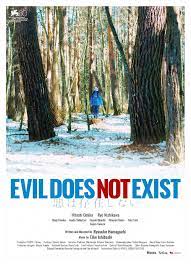
EVIL DOES NOT EXIST
Japan, 2023, 106 minutes, Colour.
Hitoshi Omika,
Directed by Ryusuke Hamaguchi.
Trees, trees… Four minutes of introductory backing for the opening credits, trees, the camera tracking through the woods, looking skywards, and meditative, poetic gaze up to trees, their branches, remnants of leaves, and trunks, tall trunks, the sky. The camera stops, we see a young girl in the forest and we realise we have shared her gaze. Then the sounds of buzzsaw and axe.
Perhaps all viewers should note that the pacing of this film is often very measured (condemned as slow and boring by some bloggers) and at times will be torture for those with a fast-forward mentality. But for audiences who are prepared to stay and ponder…
Evil does not exist! If only…
The first part of the film is in rural Japan, glimpses of snowclad Mount Fuji in the background, a man who does odd jobs around the place, Tukami, collecting containers of water from the creek for the local restaurant and other uses, collecting herbs from the grasses, caring for his daughter, and always chopping logs, expertly.
The second part of the film, quite long in itself, is a local meeting with two representatives of a building company, coming in from Tokyo, explaining the plans for a local facility for “Glamping” (a combination of glamorous and camping, designed for comfortable tourists).
In fact, looking, watching, listening, noting the reactions, the body language, the disapprovals, the applause, we have the impression that we are sitting right there in this meeting, listening to the locals and their comments about the septic tank, water pollution, the local deer, dangers of fire, and the two representatives very much on the defensive. But, they do listen, especially to Takumi, laconic but direct pieces of advice.
And, halfway through the film, the tone changes completely, the skyline of Tokyo, the buildings, the offices, a zoom conference going on, the owner of the company putting pressure on the two representatives, dismissing the opinions of the locals, urging ways of getting them onside, even approaching Talumi to be the caretaker of the camp.
Then we accompany the two representatives on the drive back to the village, the camera and ourselves sitting in the backseat, listening to their life stories, their hopes, change of pace in life. And, with them, we are back in the village, their approach to Takumi, chopping wood, having lunch, going out into the fields because his daughter has disappeared.
No neat ending here. Various suggestions, moments of violence, surreal encounters of the little girl with a shot deer, and tracking through the trees at great length, at night, the moonlit sky.
And then the film stops rather than ends, leaving it to audiences and their identification with characters and themes, nature, capitalism, condescension of the wealthy to the locals, wondering what will happen in the future – the director wanting us to make what we will of the ending and whether we are willing to make of it what we will.
- The title? Its meaning? Presentation of evil, corporate greed?
- The films of the director, arthouse, themes, nature, human interactions?
- The village setting, the countryside, the focus on the trees, the river, chopping wood, homes, streets, the restaurant, the meeting hall? The contrast with Tokyo, the high-rise, the buildings, offices? The drive in the Japanese countryside? The musical score?
- The visual style of the film, the long opening, the tracking of the trees, the image of trees, trunks and branches, the sky? And the finale, the trees, the moon in the sky?
- The little girl, her point of view of the trees? Takumi, her father, chopping the wood, going to the river, collecting the water of the restaurant, the herbs for the restaurant? Meeting his daughter at school? And his reputation in the town? His skill at doing various jobs?
- The meeting, explanation of ‘Gramping’? Two representatives, talent agency, representing the entrepreneur? The range of people at the meeting? The company, ambitions, the camp, tourism, the emerging of issues? Sanitation, capacity, water overflow, flowing downhill, contamination? The deer and their path? The danger of wildfires? The need for a caretaker full-time? The speeches by the various members of the community? The young man and his anger? The mayor and his explanations? Takumi and his measured speech? The reaction of the representatives, trying to find answers, the young woman and her sympathy? The advice to listen to Takumi? Meeting him, his explanations?
- The transition to Tokyo, the vistas, the office, the Zoom conference, the CEO, his demands, the representatives, the explanations, the boss and his determination? Condescension towards the local people? The suggestion that Talumi be on side, caretaker?
- The two returning, the drive to the village, camera in the back seat, each of them explaining their life story, ambitions, need for change, retirement?
- Going to Takumi, waiting as he chopped the wood, the representative wanting to chop the wood? The meal, the reaction of the waiter? The helping with carrying the water from the river? The representative and his wanting to enjoy the country style, offering to be caretaker? The sympathetic woman?
- The uncertainties of the ending, the little girl, her disappearance from the school group, the search for her? Finding her, the deer, wounded? The attack on the girl? Takumi and his turning on the representative, choking him? Carrying the girl, the representative revive him collapsing, the images of the trees? At length? The film stopping?
- Audiences and their interpretation of the themes, the countryside and exploitation, corporations and greed, ordinary citizens?